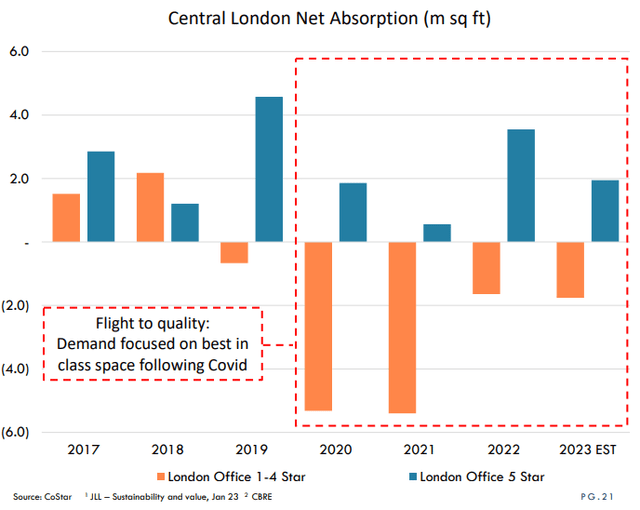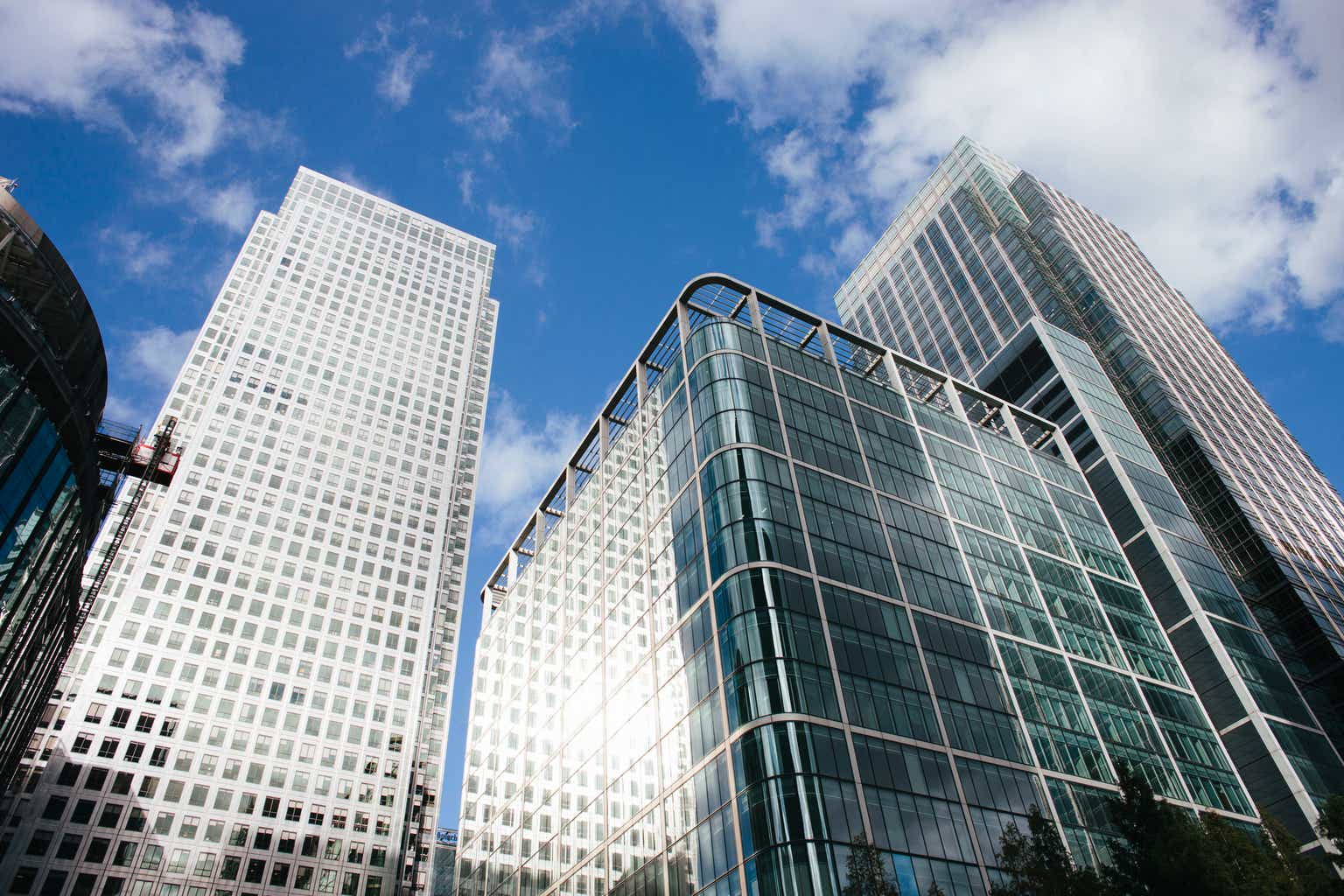British Land (OTCPK:BTLCY) offers a high-dividend yield and is undervalued, being therefore a good play for income-oriented investors within the European real estate sector.
Company Overview
British Land is a U.K. real estate company that invests and manages commercial properties, with a portfolio comprising offices, retail superstores, shopping centres, and logistics. Its current market value is about $3.9 billion and its shares trade in the U.S. on the over-the-counter market.
At the end of last March, its portfolio was valued at close to $11 billion, of which about 62% was related to offices (both under operation and new developments), while retail and logistics represented the rest.
The property market is quite cyclical and historically the market’s performance has broadly tracked GDP growth. Within real estate, the office market is one of the segments that track economic activity more directly, while in the past few years there were also some other events which changed the office market dynamics in the U.K., namely Brexit and the pandemic.
Brexit has led to some multinational companies, for instance, in the financial sector, to move some operations outside the U.K., while more recently the pandemic has led to more people working from home, both events being headwinds for demand related to office space across the country.
Additionally, interest rates are also an important driver of property values, and after several years of a low interest rate environment in the U.K. and other geographies, rising rates have been a headwind for property values in recent months. While higher rates put downward pressure on property values, this can be offset to some extent by rising rental values, but this has not been enough to offset yield compression.
Taking into account this background, it’s not surprising that British Land’s portfolio value has decreased by 12% over the last year, with offices (-13% YoY) and logistics (-24% YoY) being the segments reporting the most significant drops, while retail also declined considerably (-10% YoY) and shopping centres was relatively more resilient (-7.6% YoY).
Given that the Bank of England is expected to hike a few more times in the coming quarters due to high inflation levels in the U.K., valuation prospects for the company’s assets is not particularly bullish in the short term.
However, British Land has an office portfolio concentrated in London with relatively high quality, which is an important factor for a stronger performance compared to some of its peers. Indeed, as shown in the next graph, prime office space in London has performed better than lower-quality office space, boding well for the company’s assets both in terms of rental growth and valuations.

Office market (Briitsh Land)
Showing that British Land has a very good portfolio, its overall vacancy rate was only 3.3% at the end of fiscal year (FY) 2023 (it ends in March), which is a relatively low level of vacancy within the European real estate sector and more impressive considering that British Land is exposed to office and retail.
Indeed, in retail parks its occupancy rate was 97.3%, which is quite high, and in London urban logistics the vacancy rate was 2.3%. These are very strong levels of occupancy, which is a strong signal of British Land’s quality portfolio and positive dynamics in the London market, which bodes well for its revenue and earnings strength in the near future.
On the other hand, its shopping centres have a lower occupancy as this market is still recovering from the pandemic hit and some tenants are still struggling. This explains why the company’s vacancy rate was 5.9% at the end of last FY, an acceptable level compared to other companies in the sector, as I’ve analyzed recently on Unibail-Rodamco-Westfield (OTCPK:UNBLF), which is a specialized company in this segment, and has a vacancy rate above 9% in the U.K.
Going forward, British Land is expected to maintain its strategy, investing in new developments of which its Canada Water Masterplan is the most important one and will require significant outflows over the next few years, but also performing active portfolio rotation to generate value. While in the short term its business will likely continue to be impacted by a challenging macroeconomic environment, the company is well managed and should create value for shareholders over the long term due to its quality portfolio focused in prime locations.
Financial Overview
Regarding its financial performance, the company has reported relatively poor results over the past few years, negatively impacted by the pandemic, which have affected both the office and retail segments. As a company strongly exposed to these segments, not surprisingly British Land’s revenues have declined from $753 million in FY 2020, to some $548 million in FY 2023.
However, over the past fiscal year, its operating performance has improved on an annual basis, as the reopening of the British economy has led to higher retail sales and office rent collection rates.
Indeed, its like-for-like rental growth was 6% in FY 2023 to $548 million, which is a positive outcome considering the challenging market backdrop, and its underlying profit amounted to $324 million (+7% YoY). By segments, both office and retail parks reported strong rental growth above 6% YoY, while shopping centres increased rents more modestly (+2.6% YoY). Its underlying earnings per share amounted to $0.35, an increase of 4.8% YoY.
Regarding its balance sheet, contrary to other European real estate companies, its leverage position is more modest, showing that British Land’s management has a conservative approach. At the end of last March, its loan-to-value (LTV) ratio was 36% (up by about 300 basis points in the year), and its net debt-to-EBITDA ratio was 8.4x, while there are other European peers with LTV ratios above 50% and net debt-to-EBITDA closer to 15x, such as Aroundtown (OTCPK:AANNF), which I have covered recently.
This more conservative leverage position is a positive factor for British Land’s investment case, making it less vulnerable to rising interest rates and making it a more defensive play within the European real estate sector, particularly compared to other companies highly exposed to the office segment.
This also explains why British Land has resumed its dividend payments more rapidly than some of its peers, such as Unibail. While British Land suspended dividend distributions back in 2020 due to the pandemic, it resumed dividend payments in 2021 and has recently increased its annual dividend to $0.28 per share (+3.3% YoY).
This is in-line with its goal of distributing some 80% of annual profits to shareholders, thus its dividend is directly linked to the company’s annual earnings. At its current share price, British Land offers a dividend yield of about 6.6%, which is quite interesting for income investors. Moreover, as the company has a strong development pipeline over the next few years due to its large project Canada Water, it’s likely that earnings will increase and its dividend should follow the same footsteps.
Indeed, according to analysts’ estimates, its dividend is expected to increase to about $0.30 per share by FY 2026, which seems conservative, and the company may beat these estimates in the coming years.
Conclusion
British Land has an interesting business profile, given that it’s exposed to highly cyclical real estate segments, but its strategy of owning quality properties in London is proving to be quite successful. This is clearly visible on the company’s below-average vacancy rate, boding well for revenue and earnings growth ahead.
Regarding its valuation, like many of its peers, British Land is currently undervalued due to the rising interest rate environment and weak investor sentiment toward real estate stocks, trading at some 0.57x net asset value and 13x FFO (vs. 19x average over the past five years). Thus, its cheap valuation and high-dividend yield make it an interesting income investment for long-term investors right now.
Editor’s Note: This article discusses one or more securities that do not trade on a major U.S. exchange. Please be aware of the risks associated with these stocks.
Read the full article here




